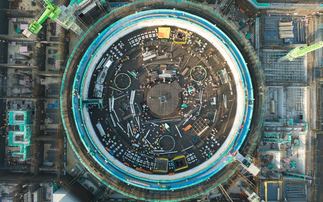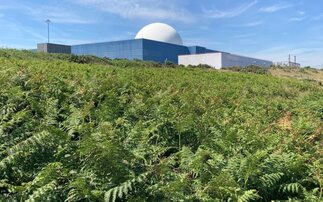The old joke suggests nuclear fusion is always 30 years away, but undeterred a British firm is now working to connect a nuclear fusion reactor to the grid by 2030
"We can see a much more rapid way of developing fusion energy," claims Kingham. "If you can keep your devices relatively small and use high performance new materials there may be technical risks associated with it, but it gives you the chance of moving much more quickly and at lower costs than by working with huge devices."
While the two devices produced so far were not used to try to produce nuclear fusion, they tested key concepts in the development of the firm's spherical Tokamak design - including that high temperature superconducting magnets could produce a plasma for 24 hours on a Tokamak.
The firm is now working on its third device using copper magnets again, where it aims to produce far higher magnetic fields and thus reach a plasma temperature of 15 million degrees - hotter than the centre of the sun. The fourth device will combine this technique with high temperature superconducting magnets, and hopefully produce electricity for the first time, while the fifth device - likely to stand at between six and eight metres - would be a grid-connectable pilot plant.
Ultimately Tokamak Energy plans to produce units of around 100MW, a size similar to small modular fission reactors and capable of providing enough power for a large town. The units could then be grouped together if needed into a conventional baseload plant, the company argues.
And while the initial units would aim to provide be a financially competitive rather than a cheap source of energy, a major advantage of their smaller size would be the possibility of factory manufacturing which could rapidly reduce costs, adds Kingham.
"One of the exciting things is that if you can keep your power modules small, then you could scale up production very rapidly, so you might produce one module in the first year, by the third or fourth year you could be producing 10 a year, and in 10 years you could be producing 100s a year, so it could be scaled up very rapidly," says Kingham. It is a particularly timely vision given the government's recent announcement for funding to explore the potential for a new generation of small modular reactors.
With the whole project dependent on getting the best possible performance out of the high temperature superconducting magnets and a series of other major technical hurdles to overcome, some will remain understandably sceptical that these small nuclear fusion reactors will ever make headway on the timescale needed. However, Kingham argues that even with the firm's current budget of £10m - a tiny fraction of the JET and ITER projects - it is making rapid progress in an area which could provide a badly needed clean energy solution in the future.
"My own view is that we're unlikely to do enough to tackle climate change over the next 10 years, and so by 2025 or 2026 we're going to really need to accelerate the solutions," says Kingham. "Fusion should be there and available and ready to roll out at that stage, that's really our objective: have the solution ready at the point where it's badly needed."







